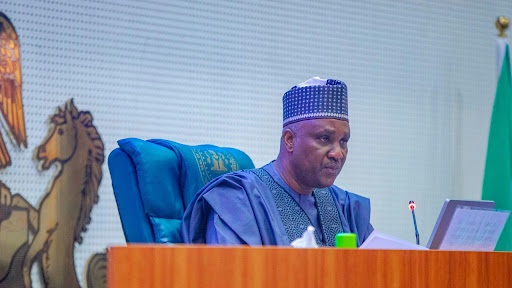The Speaker of the House of Representatives, Hon. Tajudeen Abbas, on Wednesday, expressed optimism that the establishment of additional Polytechnics would boost quality education in science, skills, arts, technical and vocational training in the country.
Hon. Abbas stated this during the public hearing organised by the House Committee on Federal Polytechnics and Higher Technical Education chaired by Hon. Kayode Laguda.
The two bills seek for the establishment of the National Polytechnic Commission, the Federal Vocational and Entrepreneurship Institute in Okota/Oshodi, Lagos State, and the Federal Vocational and Skills Acquisition College in Yankaba, Kano State.
“These initiatives are not merely legislative proposals; they represent a commitment to our nation’s future—a future where education serves as a cornerstone for economic growth, social mobility, and national development.
“The establishment of these institutions will ensure that quality education in science, skills, arts, technical and vocational training becomes accessible to all Nigerians.
“Today’s hearing aligns seamlessly with our legislative agenda aimed at enhancing the educational framework within Nigeria. We recognize that in an increasingly competitive global environment, it is imperative that we equip our youth with relevant skills and knowledge. The proposed agency and institutions will serve as beacons of excellence—providing qualitative education that meets international standards while also being tailored to meet local needs.
“In recent years, there has been an increasing recognition of the critical role that technical and vocational education plays in national development. li is no longer sufficient for our educational institutions to merely impart theoretical knowledge; we must also equip our youth with practical skills that will enable them to thrive in an ever-evolving jod market. The establishment of these institutions is a testament to our resolve to bridge the gap between education and employment.
“The National Polytechnic Commission will serve as a regulatory body that ensures standards are upheld across polytechnic nationwide. This initiative aims not only to enhance the quality of education but also to promote uniformity and excellence within our polytechnic system. By doing so, we can ensure that graduates from these institutions are well-prepared to meet industry demands and contribute meaningfully to our economy.”
In his remarks, Chairman, House Committee on Federal Polytechnics and Higher Technical Education, Hon. Kayode Laguda noted that each of the Bills is tailored towards enacting laws that will bring about the much-needed improvement in the socio-economic development of the country, and invariably promoting our quest for sustainable human capital development required for a self-reliant society.
“The objectives of establishing vocational, entrepreneurship and skills acquisition Institutions in Nigeria is to train technicians and middle-level personnel that would serve as Catalyst for rapid industrialization and the development of the real sector of the economy.
“There is therefore, the need for all stakeholders here present to be dedicated and committed in the effort of improving and developing our educational sector by being objective, constructive in our inputs and opinions on all the contending issues on the Bills.”
Other Stakeholders who spoke during the public hearing including Permanent Secretary of Federal Ministry of Education, Dr. Nasir Sani-Gwarzo expressed overwhelming support for the proposed establishment of the Tertiary Institutions, maintained that the bills are timely, important and relevant to the current time.
In his presentation, Executive Secretary of National Board of Technical Education (NBTE), Professor Idris Bugaje, expressed support for the establishment of National Polytechnic Commission saddled with the responsibility of supervision, regulation anf coordination of Polytechnics in Nigeria.
He observed that although over 700 institutions are being overnighted, yet funding remains inadequate.
While expressing regrets over the issue of dichotomy, the NBTE helmsman and ASUP National President, lamented that Polytechnic
He said currently, the NBTE is saddled with the responsibility of regulating over 700 institutions, adding that the establishment of the Polytechnic Commission will ensure proper regulation of the nation’s polytechnic as well as periodic review of their curriculum.
Also speaking, National President of the Academic Staff Union of Polytechnics (ASUP), Comrade Shammah Kpanja said the establishment of the commission is a crucial step towards achieving the country’s educational and economic goals, stressing that it will require government commitment and collaboration with stakeholders.
He said the lack of a dedicated commission for the regulations of polytechnic education in the country has hindered their capacity to actualiise their real and assigned mandate.
The ASUP President averred that the proposed commission is of great importance to the nation’s educational and economic advancement as the polytechnic plays a vital role in producing graduates with industry-relevant skills.
He added that the Federal Government can address the challenges facing the country and provide a regulatory framework that promotes quality education, industry-relevant skills, research and innovation, with the establishment of the Commission.
While venting his view on the proposed bills, Chairman, Conference of Federal Polytechnics in Nigeria, Professor Aliyu Mamman said the absence of the commission has led the lack of a scheme of service for the nation’s Polytechnics.
He said the recently released scheme of service by the Office of the Head of the Civil Service of the Federation had to be withdrawn because it created more problems in the sector than that set out to address.
While noting that the proposed Commission is long overdue, he maintained that the initiative will go a long way toward developing Polytechnic education in the country.
While analysing the proposed bill, he urged the Committee to replace a representative of Finance with Industry, including one representative of the Manufacturers Association of Nigeria (MAN), Sector Skill Councils in Nigeria; delete provision for representative of academic discipline, and insert Executive Secretary who will serve as Secretary of the Governing Council of the Commission.
Please don’t forget to “Allow the notification” so you will be the first to get our gist when we publish it.
Drop your comment in the section below, and don’t forget to share the post.
Never Miss A Single News Or Gists, Kindly Join Us On WhatsApp Channel:
https://whatsapp.com/channel/0029Vad8g81Eawdsio6INn3B
Telegram Channel:
https://t.me/gistsmateNG





